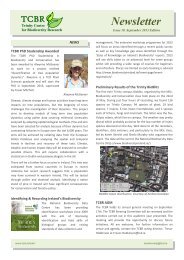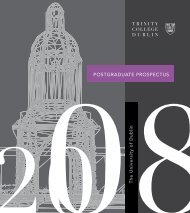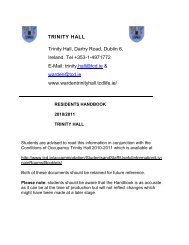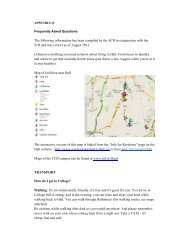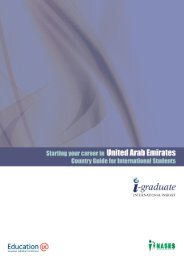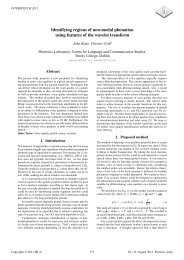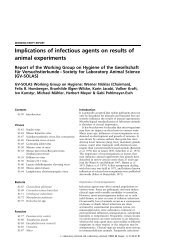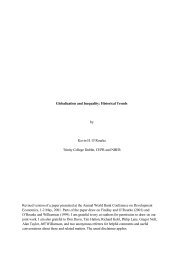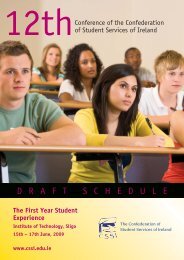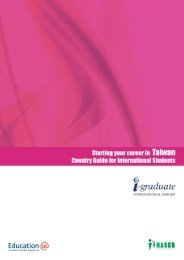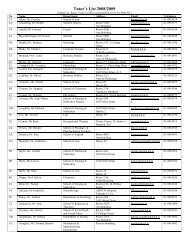Conference Programme (PDF, 1019KB) - Trinity College Dublin
Conference Programme (PDF, 1019KB) - Trinity College Dublin
Conference Programme (PDF, 1019KB) - Trinity College Dublin
You also want an ePaper? Increase the reach of your titles
YUMPU automatically turns print PDFs into web optimized ePapers that Google loves.
abstracts by stream and session<br />
Belonging’s uncertainty: Latin Americans in post-Celtic Tiger Ireland<br />
Fina Carpena-Mendez, Oregon State University, USA<br />
The neoliberal globalization project has relied on transnational mobilities to profoundly rework local spaces, subjectivities, and<br />
the developmental role of the state through shifts in the relationship to its citizens. While neoliberal reforms aimed at deepening<br />
transnational economic and political integration of Latin American countries in the global order has resulted in increased levels of<br />
migration, social inequality, and the dismantling of local subsistence economies, immigration has been central to the Celtic Tiger story<br />
of development. Economic restructuring in the last 15 years in Ireland has been dependent on foreign direct investment and the state’s<br />
withdrawal of public services and infrastructures to its citizens. In the last decade, both rural and urban areas in Ireland have received<br />
rapidly shifting and highly contingent immigration flows, including sending areas from Latin America (Brazil, Argentina, Ecuador, and<br />
Colombia mainly). Latin American migration to Ireland is extremely socio-economically diverse. Latin Americans from middle-class and<br />
working-class sectors have come to fill a broad range of occupations, from highly-skilled jobs in health care, pharmaceutical,<br />
IT and software, to industrial and agricultural, in both rural and urban Ireland. Migration networks often involve third and<br />
fourth countries and depend on the specific insertion in the labor market. Drawing on ethnographic fieldwork with Latin American<br />
families and their children in households, school classrooms, and community life, this paper examines narratives on these different<br />
migratory trajectories through several countries; how in each of these countries Latin Americans have experienced different<br />
constructions of their subject positions, identities, and ethnicity, in school, working and community life; how these learning experiences<br />
have shaped their sense of belonging and their understanding of their incorporation experiences in Irish society, and how, in turn, these<br />
experiences have affected decisions to return to Latin America or settle in Ireland. A sense of self deeply rooted in solid experience has<br />
emerged against the vanishing global neoliberal mirage of transnational social mobility, a source of delusion and revelation of terra<br />
incognita. This solidly experiential self articulates contestations to both impending futures as minorities in post-Celtic Tiger Ireland and<br />
as return migrants in Latin America, socio-economic and cultural areas ravaged by the effects of neoliberal globalization and in search of<br />
alternative governance models.<br />
Session 8h Focus on Ireland<br />
Nothing to do with me: Observation without interaction – The Irish professional social class and those they categorise as ‘immigrants’<br />
Martina Byrne, <strong>Trinity</strong> <strong>College</strong> <strong>Dublin</strong>, Ireland<br />
This paper draws on preliminary results from the first in-depth exploration of the attitudes of the Irish professional social class towards<br />
immigrants in contemporary Ireland. My experiences as an Irish professional suggested, and my preliminary findings confirm, a diverse<br />
range of attitudes are held by this social class towards immigrants. This qualitative peer research examines what informs these attitudes<br />
and if/how racialised Irish and ‘other’ identities are constructed by members of this small yet influential section of the Irish population<br />
whose relative advantages include workplace decision making (e.g. recruitment), political power and access to social networks such as<br />
the media.<br />
Available attitudinal research on immigrants in Ireland includes large-scale quantitative European studies such as Eurobarometer and<br />
European Social Surveys and small qualitative studies amongst minorities or those in the lower socio-economic groups living in areas<br />
with high levels of population diversity. Throughout Europe, however, the intersection of the professional social class and immigrants<br />
is under-researched by comparison to studies on other social classes and immigrants and no in-depth attitudinal studies have been<br />
undertaken in Ireland on relations between the professional social class and immigrants. This research addresses that gap and<br />
problematises the ‘common-sense’ acceptance that those in the professional social class have, by virtue of their social class position and<br />
education, positive attitudes towards immigrants and immigration.<br />
A predominant theme of these findings is that the work, social and family lives of the majority of interviewees do not intersect with those<br />
whom they classify as ‘immigrants’. They do not compete for work, homes, school or hospital places with immigrants and there is no<br />
expectation this will change.<br />
Due to the semi-structured nature of the interviews there are frequent discussions around who is categorised as ‘immigrant’ and why. For<br />
example, while white immigrants from Europe, North America, Australia, New Zealand are not categorised as ‘immigrants’, white people<br />
from EU accession states such as Poland are. In addition, regardless of race, ethnicity, and nationality, those perceived to be in same<br />
social class as the interviewee (i.e. professional social class) are generally not categorised as ‘immigrants’.<br />
Finally, as fieldwork began before, and continues during, a significant global recession, this study is uniquely positioned to examine<br />
theories on the impact of economic change on the attitudes of the indigenous majority towards immigrants.<br />
Both class and race are contested concepts and the relationship between the two has been theorised in a number of ways. In situating my<br />
findings within the fields of race, ethnicity and class theory I find the work of Hall (1980), Anthias and Yuval-Davis (1992), and Gilroy (2002)<br />
on the existence of a mutual relation and interconnection between class, race, ethnicity, and nationalism most useful.<br />
100



